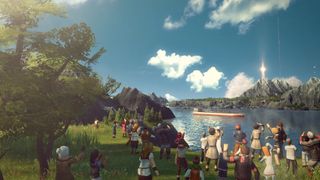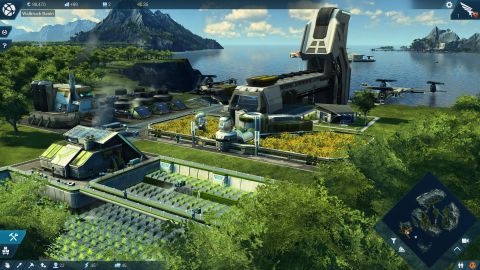Our Verdict
An ideal gateway into the city management sim, but with too little room for forward-planning.
PC Gamer's got your back
I’m a soft Southern English man with typist’s hands, although I do have a callus where I pinched a finger in the lid of a Coke Zero. I grind my own coffee and I pronounce ‘quinoa’ not at all like it’s spelled. You can understand my terror, then, upon discovering that the entirety of my nascent megacorp’s workforce was made up of Liverpudlians. They were polite enough when I stopped by to make sure I was meeting their basic needs, but simmering class war would surely impact the financials—I had to gentrify, and fast. With a spate of promotions, I transformed my all-male workers into female Operators. That’s aspiration for you. Too soon, however, I’d feel the consequences of my scorn for the working classes: Anno 2205’s bourgeoisie are insufferable, hardly moving in before registering their demand for fresh fruit, vitamin drinks and, yes, organic rice. Ladies, we’ve just survived a climate disaster; you’ll shop in discount supermarkets like the rest of us.
This is standard fare for the city-building Anno series. It’s a balancing act involving cash flow, infrastructure and the ever-more unreasonable desires of your citizens. There’s a faint moral about the whole thing—about caring for the planet and global warming—although history seems on-course to repeat itself given your inhabitants’ incredible propensity to consume. Cybernetics are all the rage in the temperate islands that remain after the world’s sea-level rise in Anno 2070, while the hipsters on the moon want Rejuvenators (caffeine pills with a mark-up, I’ll bet).

Ah yes: the moon. Anno 2205 pits you against a range of NPC corporations in a race to colonise the moon and extract its delicious helium-3 with the long-term goal of building a fusion reactor. The moon being notoriously short on farmers’ markets and health food shops, supply lines must be established and maintained as a matter of priority, factoring the shipping costs into your budget. Like all city builders it’s an optimisation challenge, but, on standard difficulty where money flows and workers are eager to serve, not a tough one. The Lunar Licensing Program is a step-by-step guide through the campaign that sits in your mission log alongside other ‘quests’ (simple escort or collect-X tasks) doled out by your competitors. It tells you what to build and when, leaving you to plug the gaps in funding on your own initiative.
You have to be reactive rather than proactive in Anno games. Strategy doesn’t come into it: you lay down some dwellings and witness the havoc they wreak upon commodity levels before improving those facilities to restore balance. Anyone coming in from Cities: Skylines will find it minimalistic, allowing you to expand just about anywhere with a road without regard for zoning and correct mistakes as you make them. To the family whose house I had to drag and drop to the other side of the map to make way for a new Infodrome, I apologise.

Once Modules are introduced, penalty-free relocation becomes an enormous benefit. No longer do you have to build two whole factories to do a job one slightly larger factory could accomplish. It’s cheaper and more efficient to expand an existing factory, which necessitates shunting a lot of stuff out of the way, particularly on the Arctic maps, where residences have to cluster around industry for heat. Lunar maps dictate that shield generators be established first to prevent meteors punching holes in rooftops. These are subtle variations, but a pleasant change of pace from the lawless sprawl of the temperate regions.
There is a sub-plot that accompanies Anno’s typically insipid RTS-lite elements in which you pilot a fleet of battleships around ice floes and islands blowing up moon terrorists and completing fetch quests for fellow CEOs (whose own battle fleets must be having their MOTs). The moon terrorists are angry because of exploitation or the distribution of wealth or some such, but I found it more enjoyable to imagine the plot of Iron Sky. These are optional distractions for additional resources—you can also progress by expanding your cities.

Anno 2205 does look gorgeous. This is a city builder that can easily tax your rig rendering a level of detail that has no value in itself but still made me smile when I realised that people on the moon do hop instead of walk. I do have to recommend installing Anno 2205 to an SSD if you’ve got the option, however: lengthy loading times between your corporate overview and each individual region put me off popping between maps as often as the game seemed to want me to.
This is the most streamlined, straightforward Anno yet. It’s pacier and much more forgiving than any other city builder that springs to mind, which makes it an excellent introduction to the genre. The balancing act lacks depth, however, and coupled with the lacklustre RTS component, it’s hard to see what a Cities: Skylines veteran would get out of Anno 2205’s gentle coaching.





An ideal gateway into the city management sim, but with too little room for forward-planning.

Homeworld 3's latest system requirements won't fill up your SSD but you'll need all the CPU and GPU you can throw at it

Baldur's Gate 3 player summons roughly 88 minions to conquer Honour Mode with a glorious army of spore zombies, elementals, and Scratch the best boy

Fallout London's project lead is not taking the surprise drop of Fallout 4's update well: 'That has, for a lack of a better term, screwed us over'
